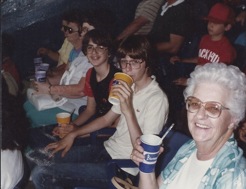
As our cameras turn to Gotham, today I invoke the kind spirit of my Grandma Schilling, who more than anyone fostered my love of this great and noble sport.
Baseball has personal memories for everyone who loves it, tales of fathers playing catch with sons, single mothers playing catch with sons, daughters forcing their dads to acknowledge their presence by playing catch, and so on and so on. Many bad, bad movies have been made on such subjects.
Sometimes, though, we take the joyous microcosm of our relationship with something large, and we mistake it for a relationship to a macrocosm that doesn’t actually exist. We seek larger significance in our love of a baseball team. The Detroit Tigers do not merely remind me of a shared and happy past sitting at a lake cabin with my Grandma and Aunt Mary and brother John, all of us listening to Ernie Harwell and Paul Carey–no, they are a symbol of Michigan’s resiliency, of our shared grit, our automobile heritage.
And etc. I both like and dislike this romantic bullshit. Mostly, however, I dislike it. Much is made of the Detroit Tigers 1968 World Series victory as an event that “healed” the city, and brought blacks and whites together after the disastrous uprising of 1967. The city burned; you could see smoke from Tiger Stadium. The next year, the team led the American League almost wire-to-wire, and then staged a remarkable comeback, down three games to one against the formidable St. Louis Cardinals.
I’ve seen Detroit Free Press pictures of African Americans and white people (many of whom I assume still lived in the city) celebrating. That’s wonderful. And I have heard of the tales of people dancing in the streets (and, man, compare that to the hell of 1984.) I wish I was there.
Here’s a question: did the city actually “heal” from that championship? Or was this merely a night of shared ecstasy, the joint smoked to momentarily forget the pain of a lingering, perhaps terminal disease?
For I think we can all agree that Detroit’s fortunes did not improve in the wake of the ’68 Tigers.
Cut to the present day: the economy is a disaster. Detroit is down to around three quarters of a million souls living in its city limits (that city was once stretched wide enough to hold nearly two million.) It’s worse than even Phil Levine could have imagined, its ruins tragically gorgeous, the stuff of coffee table books. Supposedly, Detroit’s youth population has exploded this year: cheap housing has brought in hipster artists to gentrify, which has its great points and its lousy points. I’ve heard that the Motor City had more people under 30 move into its borders than any city in America.
No one knows what to do, or even what to say: the New York Times had an article about some handsome dude who risks millions of other people’s money to make barbecue restaurants that are ‘destinations’ for white suburbanites… even though there’s great barbecue joints in Detroit (like Uptown and Park’s), landmarks that that upper-class, patronizing newspaper chose to ignore.
In 2009, Sports Illustrated comissioned a piece that has stuck in my craw as the worst piece of sportswriting I’ve seen in years. The article suggests that the economic downturn of Michigan, and Detroit specifically, “forced Tigers owner Mike Ilitch to take a most drastic measure: He raised the payroll and reinvested dramatically in his franchise.”
Good lord, what a humanitarian! I don’t know what disasters, man made or natural, “forced” him to do the same with the Red Wings years ago (or the Tigers in ’06, since he did virtually the same thing, then, too.)
The article goes on to state that “[The Tigers] were also 48–26 at Comerica Park, a record they attribute to the overwhelming responsibility they feel playing in front of their home fans, many of whom are presumably using what little discretionary income they have to watch the team play.”
Bullshit. In other words, if the city were doing well, the team’s fortunes would have actually declined, because they didn’t have anything to play for? Are we really supposed to believe that the guys on the field redoubled their efforts because they knew that the fans were having it rough economically?
For starters, I get the feeling that most ballplayers, no matter how irritated we get at their fortunes good or bad, really try their best when they play. That’s how they got good enough to end up in the majors. There’s no goodwill reservoir in them that they draw from to increase their performance when their host city’s unemployment numbers spike.
Also, might some of the players have asked for a cut in their fat salaries, you know, to reduce the price of the tickets, so that everyone can afford to see a game? Maybe offer free tickets to anyone who can prove they’re unemployed? You know, maybe actually try to do something to get the people who actually live in the city of Detroit to go to a game now and then?
This post may seem to be grousing and negative, even though we’re in these glorious moments before an exciting (I hope!) game five in New York City. But it’s not. Honestly, I simply want us all to enjoy this Tigers victory (fingers crossed), only without the usual worthless platitudes. Because these platitudes are dangerous. They’re a drug, like heroin, making you feel invincible, like the hovel you live in is actually a castle.
And I, for one, don’t want a drug. I don’t want Justin Verlander’s amazing year to be any kind of reflection on the fuckwitted auto industry and the greedy, not to mention lazy, politicians who have allowed said industry to plunder our lovely state.
I don’t want Miguel Cabrera’s sweet swing and hopefully amazing home run blasts to be seen as a salvation for the fact that we have virtually no manufacturing in the Great Lake state. Or Delmon Young’s feats of heroism on the diamond to be seen as a feat of heroism for the blue collar man, because no ballplayer is a blue collar man, even at the lowest salary (blue collar people, by their very nature, do not make six figure salaries.) I don’t want Doug Fister’s brilliant eight inning performance to be seen as anything other than remarkable pitching, and not some statement about Michigan’s being an economic underdog, when we should be anything but.
That’s bread and circuses. And bread and circuses keep us from the job at hand. Considering the shape of our country, that’s a hell of a big job.
(For the sake of brevity, we’ll skip how this attitude also results in literally billions of dollars in state-funded construction projects for wealthy team owners… like Mike Ilitch. This when we can’t raise a dollar in taxes for increased teacher salaries.)
Baseball is baseball. It is not much more on this macrocosmic scale. Certainly, it can be a huge thing in our lives as individuals, just as a ski trip, an author (thanks Kurt Vonnegut), a movie, or a coffee shop can be totally, beautifully significant. Yes, it can help us feel better in the numbing aftermath of tragedy–an earthquake, a 9/11, an economic downturn. But our troubles are our troubles, and though it remains amazing to me that a game like baseball unites red state and blue state sensibilities beneath our Tigers uniforms, it does not mean that there’s any lingering effect. In November, we’re back to being unemployed, back to the struggle.
Which is life. Which is good. I love baseball, and I love the Detroit Tigers, and I love how they conjure up memories, amazing memories, of glorious people I’ve known and loved. That is the magic of baseball, its glory and its legacy. The Tigers didn’t save Michigan in the depression, in World War II, during the ’67 uprising, or from Ronald Reagan’s greasy black hair. Though they probably provided memories to each fan, memories so rich and lasting we still cry about them today. Isn’t that enough?
